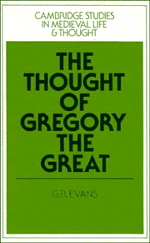Book contents
- Frontmatter
- Contents
- Preface
- Acknowledgements
- List of abbreviations
- INTRODUCTION
- PART I CONSIDERATION
- PART II TALK OF GOD
- PART III INWARD AND OUTWARD: SPIRITUALITY IN THE WORLD
- Light and silence
- Contemplation and action
- Monastic order
- Rectus Ordo
- The bishop
- Division
- CONCLUSION
- Select bibliography
- Index
- Frontmatter
- Contents
- Preface
- Acknowledgements
- List of abbreviations
- INTRODUCTION
- PART I CONSIDERATION
- PART II TALK OF GOD
- PART III INWARD AND OUTWARD: SPIRITUALITY IN THE WORLD
- Light and silence
- Contemplation and action
- Monastic order
- Rectus Ordo
- The bishop
- Division
- CONCLUSION
- Select bibliography
- Index
Summary
No one who is separated from the Church is a Christian, says Gregory (j:xx.ix.20, pp. 1018–19). The unity of the universal Church is the very bond (compago) which makes it the body of Christ (Letterii.40, ccsl, p. 127.17–21). He who suffers martyrdom outside the unity of the Church cannot be a martyr, whatever his suffering. Only a Christian who dies for the faith can be a martyr (j: xviii.xxv.40, p. 911.35–8). There is only one Church (j: xviii.xxv.41, p. 911.45).
There are two ways in which that separation may occur. It may be occasioned by entertaining wrong beliefs about God, which is heresy (j: xviii.xxv.42, pp. 912–13). Or there is the erroneousness of schism, which consists in not loving one's neighbour in the body of Christ, but standing apart as though belonging to a different body (j: xviii.xxv.42, pp. 912–13). For Gregory, the two commandments are inseparable. A Christian must love God and his neighbour. He must be both contemplative and active in living a fully Christian life. And just as in the Christian life contemplation gives rise to action in good works, so in matters of faith and practice, right beliefs make for unity among Christians. Schism will be the result of heresy and it will contain heresy within it.
- Type
- Chapter
- Information
- The Thought of Gregory the Great , pp. 130 - 142Publisher: Cambridge University PressPrint publication year: 1986



